Kári Stefánsson has the blood of virtually all of his countrymen saved beneath his workplace. He’s a visionary Icelandic physician, and 1 / 4 century in the past, he had an bold thought: use his native nation, a volcanic island close to the Arctic circle, as an enormous laboratory to look at the essence of human beings. Since then, greater than half the inhabitants, some 180,000 volunteers, have responded to Stefánsson’s name. His firm, deCODE, has analyzed all of their DNA, revealing hundreds of genetic variants linked to frequent diseases together with most cancers and Alzheimers. Francis Collins, ex-director of the US’ Nationwide Institutes of Well being, calls Stefánsson’s findings “the language of God.”
Reykjavik’s unusual daylight filters by means of the window, and Stefánsson displays, pensive, on the non secular metaphor. After 20 lengthy seconds of silence, the physician begins to talk. “I’ve difficulties with the form of God Francis Collins believes in. If I’d run into the God Francis Collins believes in on the road as we speak, the all-powerful God who can do every part, I’d in all probability inform him that he was an unbelievable asshole. Why do you let warfare occur? Why do you let younger youngsters die?,” he inquires, gazing into house, as if he have been chatting with a god current within the room.
Just a few meters under Stefánsson’s ft there’s an immense freezer chamber, at 24 levels under zero, during which robotic fingers deal with tubs with blood samples from these 180,000 beneficiant Icelanders who’ve provided their blood and medical historical past to a for-profit non-public firm. Since 1996, deCODE has found hundreds of danger components for sickness, in addition to some genetic keys to the human persona, which have been printed on the planet’s finest scientific journals.
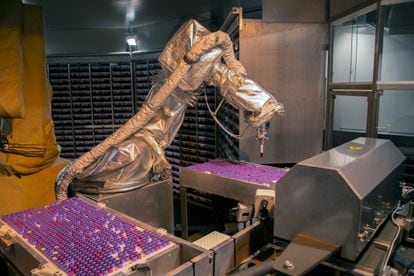
Jón Gústafsson
All the things is close by in Reykjavik. A couple of minutes’ stroll from Stefánsson’s workplace is Iceland’s Nationwide Museum. An historical manuscript recounts that Norwegian vikings settled within the island within the 12 months 874. Close to the museum’s entrance, under a glass panel within the flooring, lies the skeleton of one of many island’s first inhabitants: a warrior buried along with his imposing sword and his horse. The halls are lined with Viking consuming horns, pictures of unbelievable creatures and references to forgotten deities, like Thor and Odin, who as soon as terrorized humanity and now solely exhibit, as Stefánsson says, that gods are human innovations.
Spanish geneticist Carles Lalueza, a long-time collaborator of deCODE and director of Barcelona’s Pure Science Museum, notes, half-joking, that “as unbelievable because it appears, all Icelanders are relations.” He’s not exaggerating. Some 10,000 folks–largely Viking males from up to date Norway and girls kidnapped from the British isles–settled on the island over simply six many years after 874. Virtually all current-day Icelanders can hint their household tree to a kind of pioneers. Stefánsson, for instance, is a descendant of Egill Skallagrimsson, a person born in 910 who was one of many nice Icelandic poets and, because the physician tends to joke, one of many island’s ugliest inhabitants. The dearth of genetic range has made Iceland an excellent place to search for the DNA errors that produce human diseases.
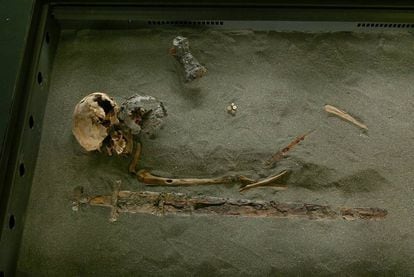
IVAR BRYNJOLFSSON
Stefánsson ruminates on his ideas about demise. One in every of his firm’s most up-to-date developments is a technique to foretell an individual’s demise in 5 years. The researchers adopted 23,000 Icelanders for 14 years, measuring the blood ranges of hundreds of proteins. The brand new device was in a position to classify folks of their sixties and seventies in keeping with their proximity to demise. Within the group labeled as high-risk, 88% of individuals died. Within the low-risk group, only one% handed away. Stefánsson acknowledges that this capability to foretell somebody’s demise is “scary.”
The physician receives EL PAÍS after a go to to his services organized and paid by Amgen, the American pharmaceutical firm that purchased deCODE for €320 million in 2012. The Icelandic firm couldn’t determine find out how to convert its scientific discoveries into capital. In 2009, when your complete Nordic nation sank in an financial disaster that ended up with dozens of corrupt financiers in jail, the group fell into chapter 11. Stefánsson is a peculiar and controversial impresario: he speaks extra about poetry than enterprise. He argues {that a} good scientist ought to learn no less than a half-dozen novels yearly. “The tools you assume with is your language. And to have the ability to assume something new you must be good at utilizing language. You need to be an acrobat in language,” he says.
Stefánsson says that he’s unhappy and depressed. Six months in the past, his spouse of 53 years died. He’s nonetheless “studying to reside with out her.” The physician, who normally spends his holidays in Spain and adores poets like Antonio Machado and Octavio Paz, writes poetry to maneuver by means of his ache. He asks himself a query out loud: “What’s life?” He responds with out lyricism: “Life are all self-assembling techniques that comprise DNA, permit DNA to copy and on the idea of the replicated DNA type on different self-assembly system of the identical variety.”
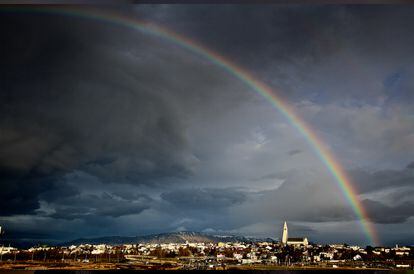
Jón Gústafsson
To Stefansson, that’s all. DNA, the molecule with the directions to type a human being from a fertilized egg, simply desires to multiply itself. It’s a recipe, written in carbon, hydrogen, oxygen, nitrogen and phosphorus, that instructions each human cell. “It’s clear that DNA doesn’t exist to serve the life kinds. The life kinds exist to serve DNA. They exist to permit DNA to persist on Earth. Preservation of DNA is the aim of life,” he explains with a bitter smile. “That’s not very romantic, however there isn’t a God. Sadly, it could be actually handy to have one,” he provides.
Stefansson remembers a poem he wrote sooner or later in 1996, when the beginning of Dolly the sheep, the primary mammal cloned from one other animal’s grownup cell, led him to reframe the which means of life. “The place do I discover, misplaced within the brightness of a sunlit day, the happiness of an sad man, lucky solely to be only one copy of himself. All the things else stinks,” he recites, gesticulating.
Stefansson’s scientific manufacturing is unmatched. He has authored 5% of the research printed within the journal Nature Genetics within the final decade. However humanity is extra advanced than he had imagined when he based deCODE. In 2003, Stefansson proclaimed that he hoped to develop “no less than 10″ prescription drugs by means of his discoveries of genetic variants related to diseases. They nonetheless don’t exist. “There are issues in improvement now who I hope will make it to the market ultimately,” the physician says.
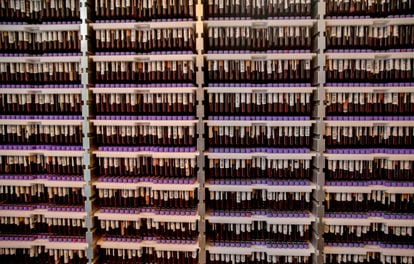
Jón Gústafsson
The problem is huge. The scientific neighborhood has recognized since 1980 that sure DNA mutations, in a gene referred to as KRAS, trigger most cancers in tens of millions of individuals. However the first KRAS inhibitor remedy reached hospitals solely final 12 months. Sotorasib, developed by Amgen, inhibits a particular mutation, referred to as KRAS G12C, that’s concerned in 13% of non-small-cell lung most cancers instances, the most typical lung tumor. Biochemist Ray Deshaies, scientific vice-president of Amgen, defined at a Reykjavik press convention that “[the delay of over three decades] wasn’t as a result of we didn’t know what we needed to do, which was inhibit the mutation in KRAS, it’s simply that we had no thought.”
Stefansson stretches his arms over the desk. -”It’s simpler to get the person to the Moon than to make a very good drug. However nonetheless, the trade does it,” he says. The physician recollects the case of AIDS, brought on by a virus detected in 1983, which has killed over 36 million folks however now will be managed with a single day by day capsule. “Which is gorgeous. You need to admit that. Mm hmm. So despite the fact that the pharmaceutical trade is somewhat bit annoying, it no less than stands out,” he observes.
Amgen is likely one of the 15 largest pharmaceutical corporations on the planet, with earnings of €7 billion final 12 months. Its worth coverage has grow to be controversial lately: the drug blinatumomab, which fights an aggressive leukemia, appeared on the US market in 2014 for €145,000 per affected person, turning into one of the costly most cancers medicines on the planet.
Biologist Robert Bradway, Amgen’s government director, affirmed in a Reyjavik press convention that not even one out of each 10 experimental medication, which appear promising in animals, work in human trials. “Mice are great. The issue with mice is that they’re mice. They at all times have been and at all times will probably be mice. And mice aren’t terribly good at predicting what’s going to occur in people, so what may work as a treatment for weight problems in mice could not work as a treatment for weight problems in people,” Bradway lamented. The vast majority of genetic variants found by deCODE solely barely improve the danger of affected by an sickness: there are 3,000 related to weight problems, for instance. However a few of these mutations can reveal the mechanisms behind a pathology. That’s why Amgen determined to purchase the Icelandic firm in 2012.
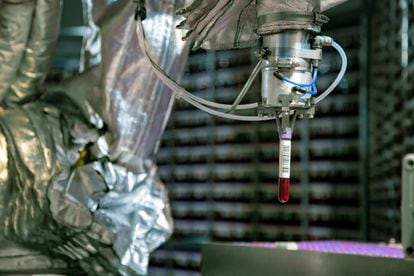
Jón Gústafsson
Bradway repeats a statistic frequent within the pharmaceutical trade: creating a drug takes 15 years and €2.3 billion. These knowledge factors are debated by some organizations, such because the Swiss Medication for Uncared for Ailments Initiative, which has invested solely €55 million to develop an efficient drug towards sleeping illness. In 2021, Amgen’s government director earned over €20 million, 166 occasions as a lot as the corporate’s common worker, in keeping with public knowledge from the group.
Kari Stefansson admits the trade has its shadows. “There may be definitely a sure battle between the non-public or the for-profit corporations which might be making medication and the general public curiosity. I can, nonetheless, let you know that there’s far more of frequent curiosity than it’s possible you’ll assume,” he says. The physician remembers that, weeks earlier than COVID pressured humanity to shelter of their houses, he referred to as the administrators of Amgen to ask them for permission to analysis the novel coronavirus. “For heaven’s sake, do this,” they answered. His knowledge demonstrated early on that half of the folks contaminated have been asymptomatic and that youngsters hardly ever bought sick. Iceland resisted the terrifying first wave of COVID significantly better than different international locations.
The Icelandic physician does, nonetheless, have enemies in excessive locations. Bioethics professional Henry Greely, director of Stanford College’s Heart for Regulation and Biosciences, has publicly spoken towards Stefansson’s “notably abrasive” persona, accusing him of profiting from Icelanders with out sharing the earnings. Alternatively, Icelandic economist Svala Gudmundsdottir has praised the deCODE founder’s “well-known generosity” after he donated costly medical tools to Rekjavik’s college hospital and for finishing up large COVID exams freed from cost.
The Icelandic firm has the DNA of complete households on the island. The info evaluation has revealed shocking keys to human persona. Stefansson speaks of “genetic nurture”: a mother or father’s genes, together with people who their youngsters don’t inherit, mark an individual’s future. The genes that you simply don’t have have an effect on your grades in class, the age when you’ve got your first baby, your levels of cholesterol and the variety of cigarettes you smoke. “I believe that the liberty of the free will is very restricted. You’re genetically programmed to need sure issues and also you’re genetically programmed to not need different issues,” Stefansson claims. “So I believe free will is an phantasm.”
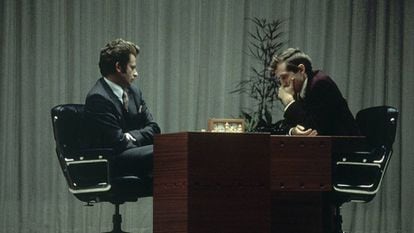
Among the finest chess gamers in historical past, the American Bobby Fischer, moved to Iceland in 2005, fleeing from his nation’s authorities, who sought to punish him for violating sanctions towards Yugoslavia after taking part in a pleasant event in 1992. His escape to the Nordic island wasn’t a coincidence. Fischer had been an idol there since 1972, when he defeated the Soviet Boris Spassky within the midst of the Chilly Struggle. The encounter was a nuclear battle over a chess board. When he returned to Iceland over three many years later, sick and near demise, Bobby Fischer turned pals with Kari Stefansson.
The 62-year-old grasp had misplaced his thoughts, sufferer of “a form of paranoid psychosis,” because the Icelander recollects, obsessive about Jews, black folks and girls. Regardless of all of it, the 2 new pals hung out collectively in Reykjavik, often having “marvelous” conversations. The Icelandic documentary Me and Bobby Fischer (Fridrik Gudmundsson, 2010) reveals a few of these memorable talks. In considered one of them, from a transferring automotive, the chess participant rants about genetic analysis and compares it to the work of physicists who introduced concerning the atomic bomb. The dialogue, a veritable philosophy class, ends in shouts, despite the fact that Stefansson started making an attempt to make amends.
—What we’re doing in my firm is just making an attempt to find what life is about, we’re not manipulating it in any means.
—Similar to the scientists have been making an attempt to find what the atom is all about and look the place it has led.
—That has led to deeper understanding…
—It has led to stockpiling hydrogen bombs!
—That’s not the consequence of that.
—Yeeeeeeees.
—That’s the consequence of evil exploitation of silly folks.
—The…
—Take heed to me! In case you are gonna attempt to put a ban on the invention of recent data, you might be starting to manage the world in an unpredictable method, since you don’t know what the data is till it has been found! So how are you going to manage what we will uncover?
Stefánsson remembers these discussions now. Since Bobby Fischer’s demise in 2008, deCODE has continued to light up human beings’ genetic secrets and techniques, because of the 180,000 Icelandic volunteers and two million different folks from around the globe who’ve participated. Different international locations, together with the UK, have additionally begun large-scale makes an attempt to learn their residents’ DNA. “Data in and of itself isn’t an evil,” Stefansson insists. After a quarter-century discovering genetic variations amongst human beings, the Icelandic physician is left with a lesson from his distant volcanic island: “We must always must keep in mind that we’re one species, we’re one variety. And what separates us is a lot lower than what joins us. We must always not use human range to discriminate towards one another. We must always have fun human range.”